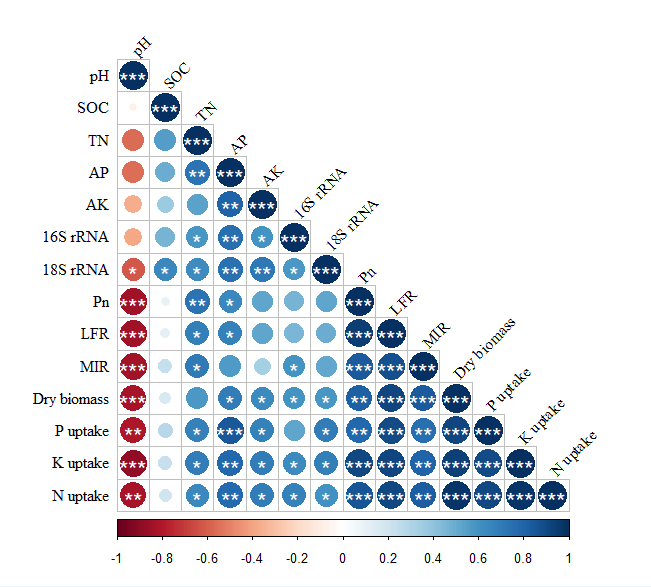Azalea (Rhododendron), an acidophilous woody plant, has been widely planted in urban green spaces. Although azalea plants have a species-specifc ericoid mycorrhiza (ERM) to improve their nutrient absorption and to help survival in harsh environments, the declined quality of urban soils has threatened their survival and led to a large decrease in their plantation area. Therefore, it is urgently needed to improve urban soil quality in order to keep a sustainable development of urban ecosystem.
Recently, azalea innovation team of Jiangsu Academy of Agricultural Sciences in China, published an online research article entitled “Biochar pyrolyzed at low temperature enhanced acidophilous plant growth by promoting rhizospheric microbes in a slightly alkaline urban soil” in Biochar (Impact factor: 9.532). The team performed a pot experiment to investigate changes in azalea morphology and physiology, as well as its rhizosphere soil chemical and biological properties in a slightly alkaline urban soil under the amendment of biochars that pyrolyzed at three temperatures (i.e., 350, 550 and 700 °C). The results showed that the effects of biochars on plant growth and soil properties depended on pyrolysis temperature. In comparison with the non-amended control, 350 and 550 °C biochars showed significant promotions on the azalea growth in terms of photosynthetic characteristics, biomass, root morphology, and N and P uptake. Whereas, 700 °C biochar showed an inhibition effect on them. 350 °C biochar decreased soil pH and increased soil available P and K contents and the activities of α-glucosidase, N-β-glucosaminidase, phosphatase and sulfatase. In addition, 350 °C biochar signifcantly enhanced bacterial 16S rRNA and fungal 18S rRNA gene abundances in the rhizosphere soil of azalea and mycorrhizal infection. Correlation analysis indicated that soil pH, available nutrients and fungal abundance had positive associations with the enhanced plant growth parameters (Fig. 1). Therefore, these findings suggest that biochar produced at low temperature could be a feasible strategy for enhancing acidophilous azalea growth and improving urban soil quality.
The first author of the study is Huimin Zhou, the assistant professor in Institute of Leisure Agriculture in Jiangsu Academy of Agricultural Sciences. The corresponding authors are Jiale Su (professor in Institute of Leisure Agriculture in Jiangsu Academy of Agricultural Sciences) and Junhui Chen (associate professor in Zhejiang A and F University). This work was funded by the National Natural Science Foundation of China under grant number of 41807100 and 41977083; Jiangsu Agricultural Science and Technology Innovation Fund under grant number of CX (19) 3047; Jiangsu Provincial Forestry Development Special Fund [SuCaizihuan (2020) No. 26]: Rhododendron Germplasm Resources Center of Jiangsu Academy of Agricultural Sciences.
The article DOI: 10.1007/s42773-021-00114-1

Fig. 1 Correlation coefficients between soil properties and plant characteristics. ***indicates that the correlation is signifcant at P < 0.001; **indicates that the correlation is signifcant at P < 0.01; *indicates that the correlation is signifcant at P < 0.05. SOC: soil organic carbon, TN: total nitrogen, AP: available phosphorus, AK: available potassium, 16S rRNA: abundance of bacterial 16S rRNA gene copies, 18S rRNA: abundance of fungal 18S rRNA gene copies, Pn: photosynthetic rate, LFR: length of fine roots, MIR: mycorrhizal infection


